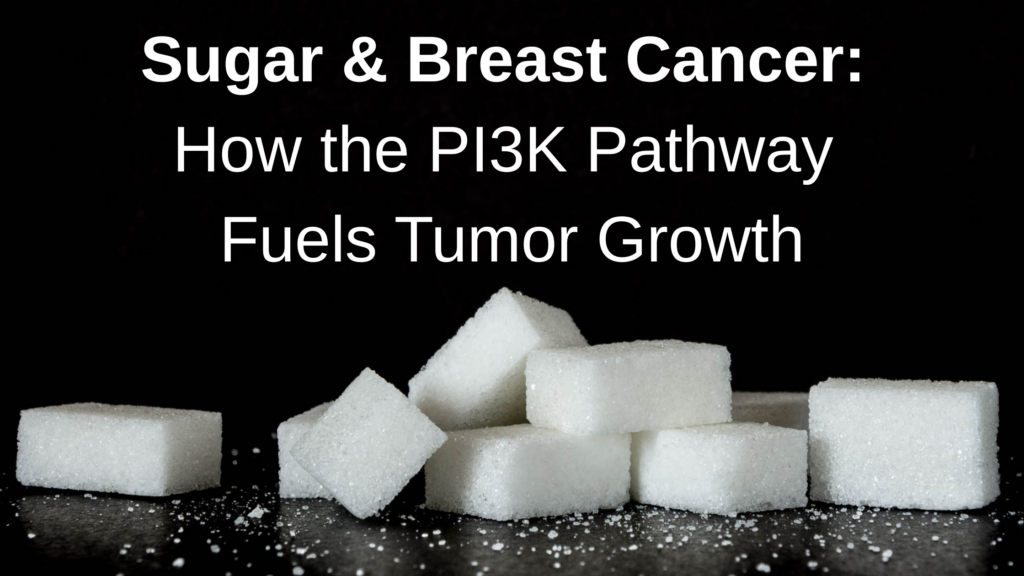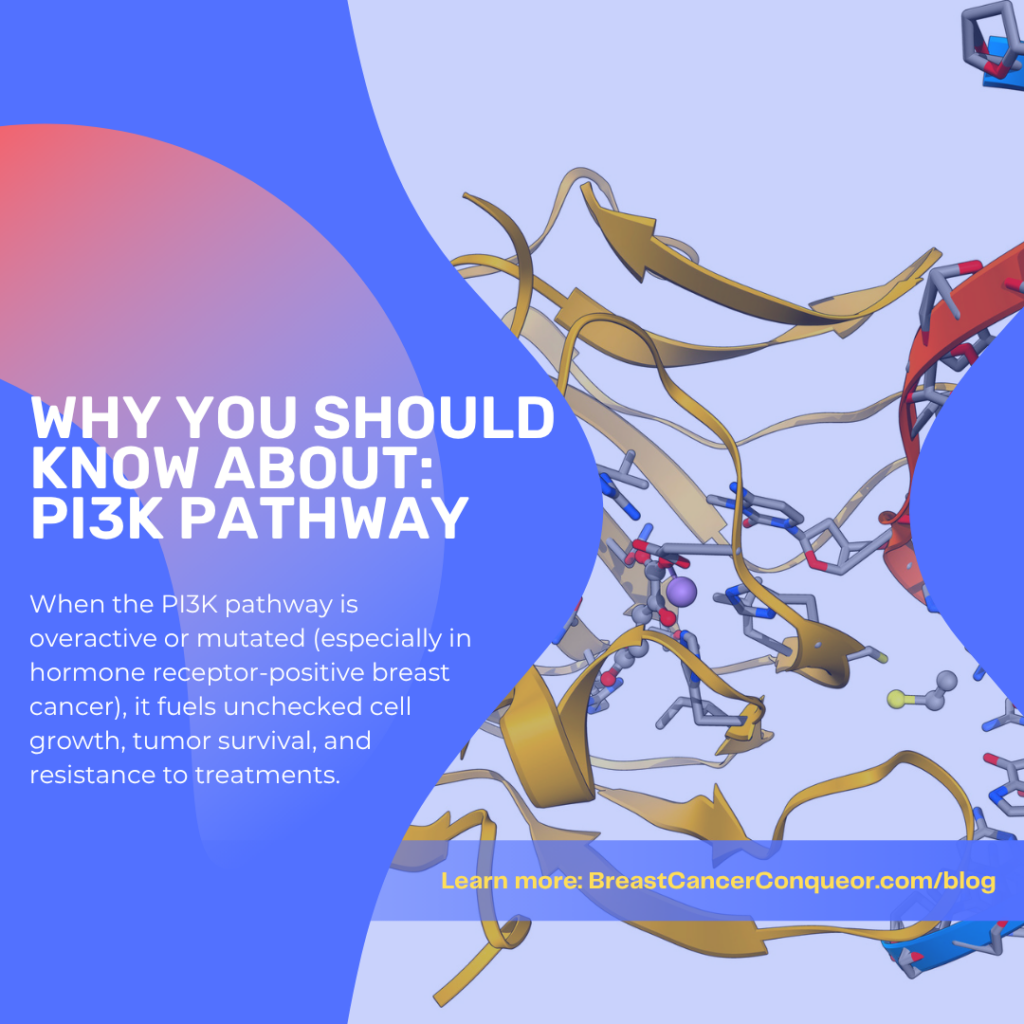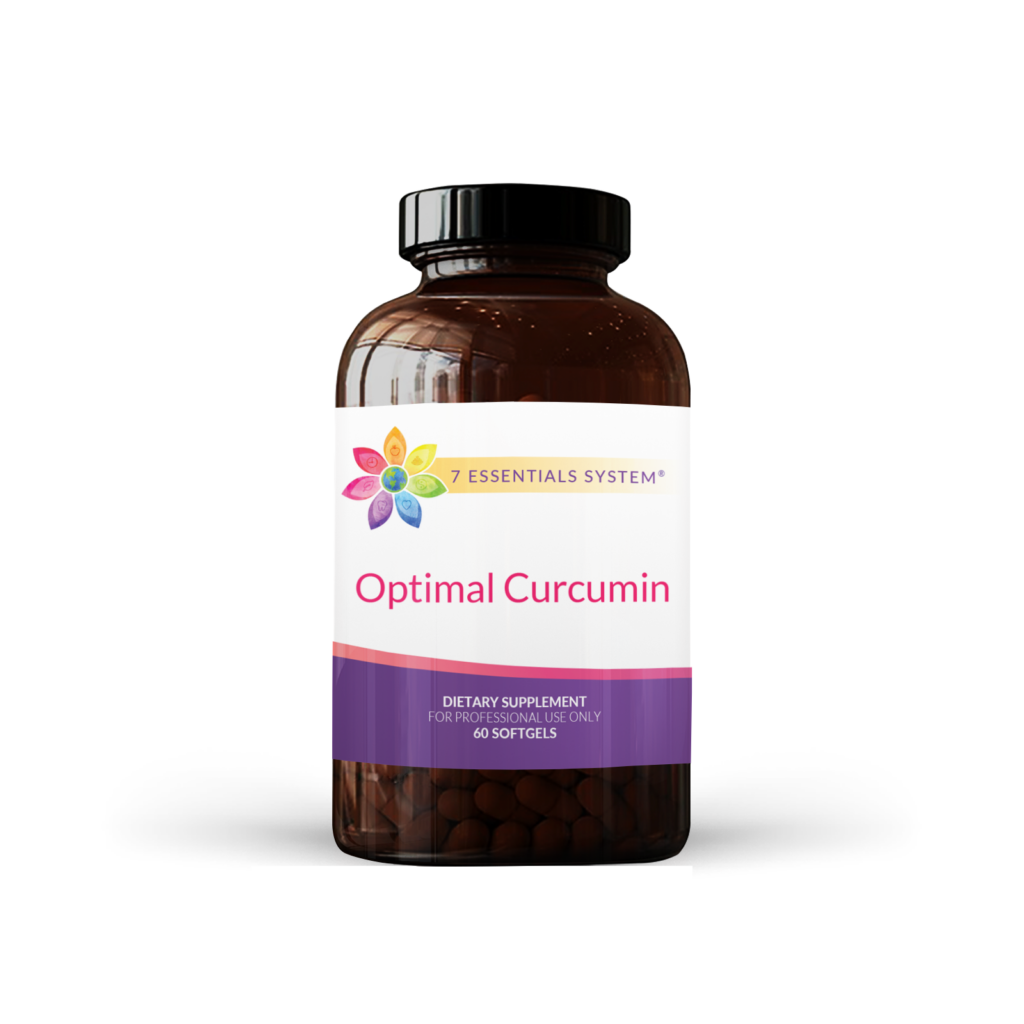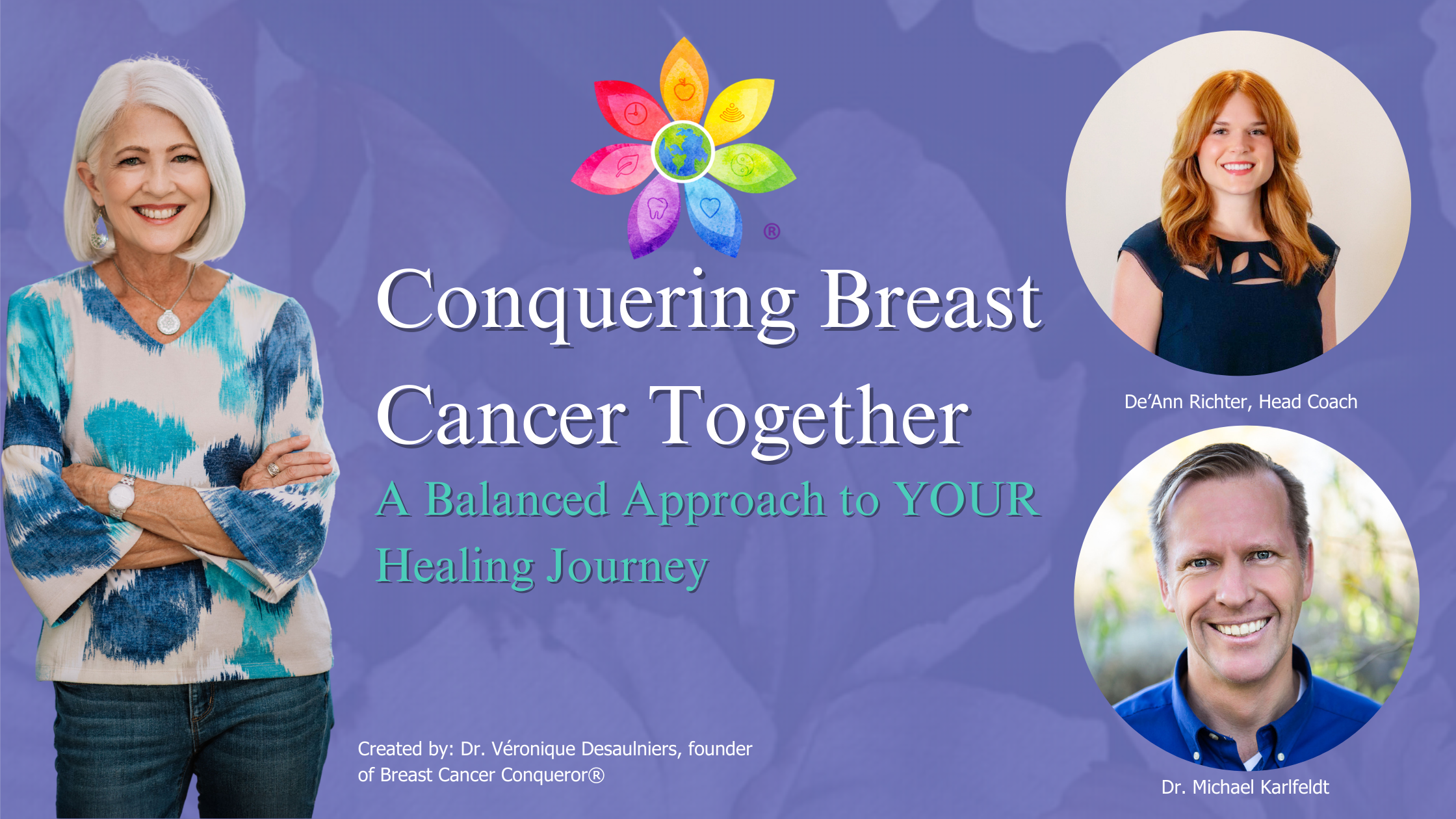
Quick Read:
- When the PI3K pathway is overactive or mutated (especially in hormone receptor-positive breast cancer), it fuels unchecked cell growth, tumor survival, and resistance to treatments.
- High insulin levels also activate the PI3K pathway, feeding cancer cell growth.
- Supplements such as Curcumin, DIM, Quercetin, and Super E Plus turn down the PI3K pathway.
You’ve probably heard the phrase “sugar feeds cancer.” But do you know how that works on a cellular level and what it has to do with your healing journey?
This blog post dives deep into the science behind sugar, insulin, and a powerful pathway in the body called PI3K. It’s a critical pathway scientists have nicknamed “a master switch” in cancer development, so understanding it is key to making empowered choices about your healing.
What Is PI3K, and Why Does It Matter?
PI3K stands for phosphoinositide 3-kinase. It’s an enzyme and a signaling pathway in your cells that helps control growth, metabolism, and survival. When everything is functioning properly, PI3K plays a healthy role in how your body repairs tissue and responds to external stimuli like food or hormones.
But here’s why it’s called the Master Switch:
When the PI3K pathway is overactive or mutated (especially in hormone receptor-positive breast cancer), it fuels unchecked cell growth, tumor survival, and resistance to treatments. This happens in up to 80% of cancers (study).
When you eat sugar and processed carbs, your blood sugar spikes. In response, your pancreas releases insulin to help move that sugar into your cells. But high insulin levels also activate the PI3K pathway, which can feed cancer cell growth. It’s a horrible cycle.
Currently, there are several ways to manage your PI3K enzyme, including pharmaceutical drugs, diet, and natural supplements. Keep reading for insight into each option, so you can make educated decisions for your healing journey.

PI3K Pathway -Targeting Drugs and the Insulin Paradox
There are drugs currently in use and under development to inhibit PI3K for cancer treatment. One of the first FDA-approved drugs in this category is Alpelisib (Piqray®), used specifically for advanced HR+ breast cancer. However, scientists have discovered a major issue with these inhibitors: They can increase blood insulin levels.
Here’s why: When the PI3K pathway is blocked in healthy tissues like muscle and fat, your body becomes temporarily insulin-resistant. In response, it pumps out even more insulin to lower blood sugar. However, that extra insulin reacts to the PI3K pathway in tumor cells, which could effectively cancel out the drug’s benefits.
This is what scientists mean when they say:
“Insulin feedback induced by PI3K inhibitors may reactivate the PI3K-mTOR signaling axis in tumors, thereby compromising treatment effectiveness.” (Study) Translation: The very drug meant to shut down cancer’s fuel line might, in a roundabout way, reopen it—if you’re not also managing your insulin.
Why You Must Test Your Blood Sugar and Insulin
One thing we know to be true: insulin resistance and high blood sugar promote breast cancer proliferation. Which is why the first lesson in our small group coaching programs is to teach women how to test their blood sugar. We suggest doing it in the morning and 1-2 hours after each meal, so you know what foods spike your blood sugar and how to balance it. You should also monitor your HbA1C and fasting insulin quarterly with your medical providers.
Optimal reference ranges can fluctuate depending on your individual makeup. Always discuss what is best for you with your physician, coach, or health-care provider. With that in mind, here are some helpful ranges our coaches help clients work toward that you may want to consider:
- Insulin, total, serum (fasting) <3
- HgA1c, hemoglobin A1C <5.3
- IGF-1 (insulin growth factor) <100
Below are a few key points to know, but for more details and everyday solutions, please read this blog post on the blood sugar and cancer connection and this one on testing your blood sugar.
The main points Wellness Warriors should know about blood sugar and insulin:
- Sugar feeds cancer cells. Cancer cells have more insulin receptor sites for glucose compared to healthy cells, which means that cancer cells get fed first when it comes to your blood sugar.
- High blood sugar prevents healing. High blood sugar leads to insulin resistance and can also make breast cancer cells more resistant to chemotherapy, other immunotherapies, and hormone therapies.
- Insulin resistance breaks down body systems. Insulin resistance occurs when your body’s cells don’t respond properly to insulin, a hormone that regulates blood sugar levels. Spikes in blood sugar tell your pancreas to release more insulin to move blood sugar into your cells, but eventually, your body won’t be able to keep up. Your body will respond with pre-diabetes symptoms such as blurred vision, fatigue, tingling feet, frequent urination, etc.
- Too much IGF-1 can lead to cancer. IGF-1 is a protein that is vital for early childhood development but is linked to higher risks of ER+ cancer, lowering immune function, and increasing dense breast syndrome.
Action plan: Test your blood sugars daily with the CONTOUR NEXT EZ Blood Glucose Monitoring System (or something similar) and HbA1C and fasting insulin quarterly with your medical providers.
Diets and Supplements That Turn Down the PI3K Pathway
What you consume directly affects insulin and PI3K activity. This is why many women follow versions of keto and low-carb diets, as well as supplement with powerful plant compounds to regulate this “Master Switch.”
However, the most effective way to know precisely the type of food and supplements your body needs is to TEST. One option that Dr. V recommends is the Nutrition Genome Test, and you can learn all about it via this blog post.
When strategically done, Keto and low-carb diets can improve insulin sensitivity, reduce cancer-promoting inflammation, and may enhance the effectiveness of PI3K inhibitors.
 There are also plenty of supplements that act as natural PI3K inhibitors, and below are some of the ones we found work the best for Breast Cancer Conquerors.
There are also plenty of supplements that act as natural PI3K inhibitors, and below are some of the ones we found work the best for Breast Cancer Conquerors.
- Curcumin
The active compound in turmeric, curcumin, has been shown to downregulate the PI3K/Akt/mTOR pathway and induce apoptosis (cell death) in cancer cells. Curcumin also provides a host of other cancer-healing benefits described in this blog post, and you can buy a highly bioavailable supplement directly from our store.
- DIM (Diindolylmethane)
Found in cruciferous vegetables like broccoli and kale, DIM helps balance estrogen metabolism and may inhibit the PI3K/Akt signaling pathway in breast cancer cells. To learn more about DIM please review this blog post, check out our Hormone Clearing Bundle, and buy DIM here.
- Isoflavones (Found in Fermented Soy)
These plant compounds, especially genistein, have demonstrated anti-cancer effects by modulating PI3K and other cell-signaling pathways. Learn more about safe soy here.
- Quercetin
Quercetin literally “freezes” breast cancer cells. It works on multiple fronts so that cancer cells never even have a chance to form a tumor—and has PI3K-inhibiting effects. To learn more about this powerful supplement, please review this blog post and buy Quercetin here.
- Tocotrienols (a form of Vitamin E)
Unlike the common tocopherol form, tocotrienols are potent anti-cancer agents shown to suppress tumor growth via inhibition of the PI3K pathway. Our Super E Plus is a tocotrienols-only product sourced from annatto trees, one of the purest ways to get vitamin E. Vitamin E also supports healthy arteries, brain, eyes, and hair growth, and boosts your immune system. It also protects cellular membranes, reduces inflammation, and prevents free radical damage. You can buy it directly from our store here.
Of course, this isn’t about one-size-fits-all eating and supplementing. It’s about working with your medical team and BCC Coach, testing your biomarkers, and choosing a healing nutrition plan that supports your unique body.
It’s Time to Test and Thrive!
We’ve said it before, and we’ll say it a million times again: Healing is about strategy, not guesswork. TEST. So you don’t have to guess and stress! There are endless amounts of tools, supplements, therapies, and ways to educate yourself (such as our blog and podcast!).
We also teach this in our 7 Essentials System® coaching programs. If you’re not ready for private coaching but want to learn the 7 Essentials System®, check out our self-paced, on-demand course here.
Do the work and use everything to your advantage because it’s your time to thrive!

